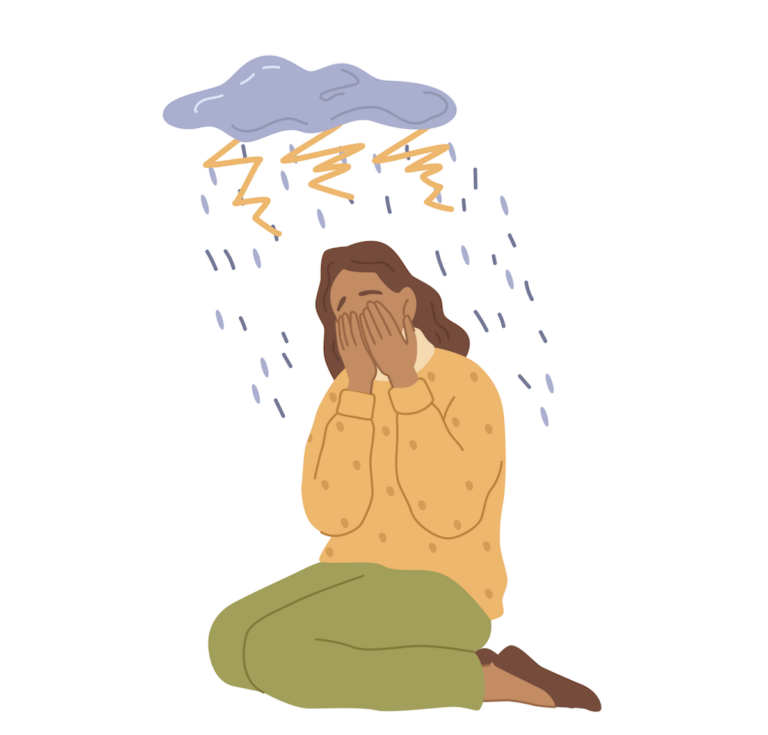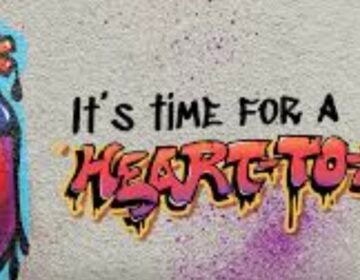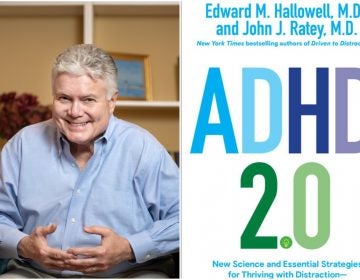What is rejection sensitive dysphoria, and why does it impact people with ADHD?
RSD begins when a person has perceived rejection or has actually failed at a task. The awareness of their shortcomings is then emotionally internalized at a high intensity.
Listen 11:37
Rejection Sensitive Dysphoria, which is not a medical diagnosis, is a self-reported problem that interferes with your ability to regulate your emotional responses to feelings of failure and rejection. (Sensvector/Big Stock Image)
This story is from The Pulse, a weekly health and science podcast.
Find it on Apple Podcasts, Spotify, or wherever you get your podcasts.
Nikki Scott, 33, was standing in her kitchen one evening, preparing her favorite side dish for dinner: cheesy broccoli.
Scott and her partner were struggling financially at the time, so she was looking forward to this home-cooked meal. But when she began to mix the two ingredients together in a glass bowl, it all slipped through her hands. Glass shattered on her kitchen floor. Broccoli was everywhere.
“I was absolutely hysterical,” Scott said. I had to go sit in the closet and hyperventilate and just sob uncontrollably.”
Her head was spinning. Scott was questioning her mistake and her reaction.
“I just remember sitting there in the dark, bawling my eyes out over this broccoli. ‘What is wrong with me? Like, it’s just broccoli. Why am I so upset?’ It was that trigger that made me think, like, ‘I am such a loser.’
Scott sat in the closet for an hour. Then she wiped away her tears, left the closet, and began to clean up the mess. When her partner came home, he didn’t think this was such a big deal.
But Scott couldn’t stop thinking about it. The entire incident influenced her worst thoughts about who she was as a person.
“So, it starts out as one thing, and then my brain kind of rapid cycles through all of the things about myself that I don’t like — all of the ways that I feel like — I’m not where I should be in life or I’m not the partner I should be or not the mother I should be.
This experience was not new to Scott, and the rapid and crushing reaction to a small mishap was a familiar incident that wreaked havoc over her entire life.
Scott’s peers often deemed her as too sensitive — that her weekly crying sessions in the bathroom from being rejected by others or personal failure were not rational responses but actually, moments that illustrated a lack of control over her emotions.
“I would swing from being completely balanced and happy to just being crushed over something within minutes,” Scott said.
These criticisms were hard truths to swallow. Scott felt that her responses were sometimes irrational, yet the emotions were impossible to tame and explain.
She sought help in adulthood but was misdiagnosed with Borderline Personality Disorder and Bipolar Disorder at separate times.
With nothing to explain her responses, she began to feel ashamed. Scott started to believe these overwhelming episodes were just a part of her personality, and the notion of developing thicker skin had skipped her.
That was until she came across a condition in an online article.
“I thought, ‘Wow! That sounds exactly like [what] I have,’” she said. “It’s the thing that I dealt with my entire life. And I didn’t know there was a name for it.”
Subscribe to The Pulse
The condition was called rejection sensitive dysphoria or RSD. It begins when a person has perceived rejection or has actually failed at a task. The awareness of their shortcomings is then emotionally internalized at a high intensity. The feeling is so overwhelming that it often disturbs daily activities for hours, and it is accompanied by long crying sessions, intrusive thoughts, psychological pain, and, sometimes, thoughts of suicide.
The episode is believed by experts to be associated with people with Attention Deficit Hyperactivity Disorder. But when Scott was diagnosed with moderate to severe ADHD in adulthood, her doctor nor the diagnostic material for adult ADHD mentioned RSD episodes or the possibility of sensitivity to rejection.
The Diagnostic Statistical Manual for Mental Health Disorders, or the DSM-5, lists symptoms for adult ADHD that are grouped into two categories: inattention and impulsivity-hyperactivity. The characteristics are things such as disorganization and problems prioritizing, poor time management skills, inability to pay attention, and more.
“I think it’s still early enough that a lot of people don’t terribly believe in it,” Scott said. “But at the same time, I think that’s probably the same crowd that also doesn’t entirely believe in ADHD, to begin with. I’m sure a lot of people view it as making excuses for poor behavioral control. But the overwhelming response I’ve gotten from other people with ADHD is, ‘Oh, that makes sense. That explains a lot.’”
Figuring out RSD
There’s no published peer-reviewed research on RSD. But that doesn’t mean people haven’t tried to study it.
William Dodson, a private practice psychiatrist in Denver, Colorado, was the first person to put a formal name to the condition. He did this after looking through old research notes of an ADHD field pioneer from the 1960s, Paul Wender.
In the notes, Wender noticed that people with ADHD had experienced a horrifying and instant response to rejection or personal failure. The research on this feeling was still in its early stages.
Dodson was interested in continuing Wender’s work.
“He’s the guy that saw it first,” Dodson said. “So, I started asking my patients about it. And I was just astounded that virtually all of them said that it was a very big deal, but they told no one about it. It was their deepest, darkest secret.”
After speaking with patients, Dodson coined the term rejection sensitive dysphoria and went on to write a research paper with colleagues that defined the condition and explored its characteristics: that the mood switch was instantaneous, could manifest as physical pain, and more. But his efforts were rejected multiple times over the span of 10 years, and he ultimately gave up on the research.
Dodson still believes RSD should be researched, as his patients to this day say they suffer from these kinds of episodes. But regardless of the lack of research, people with ADHD have openly shared their detailed descriptions of their experience with RSD — what it feels and looks like.
Users on Twitter and Reddit have brainstormed why so many people with ADHD say to experience this and how to treat it.
Jillian Enright, Autism and ADHD Coach at Neurodiversity Manitoba in Canada, who lives with both conditions, is someone who has tried to piece together what RSD is and how it manifests.
After finding no research on RSD, she decided to look inward at the lived experience of people with ADHD.
“People with ADHD and people who are different in any way receive more corrections and criticism than other people who fall within the average or the norm,” Enright said. “So, it kind of stands to reason that we would become more sensitive to rejection or criticism because we experience greater amounts of it.”
Enright found that classroom studies estimate that by age 12, children with ADHD are more likely to hear 20,000 additional negative comments than their peers without ADHD.
And then, Enright found something that could further explain why RSD is an instant and intense mood switch.
Researchers have documented that people with ADHD generally have challenges processing their emotions due to their brain makeup — emotions like happiness, sadness, fear, and anger. So much so that researchers are working to get this difficulty included as a core element of the disorder, along with inattention, hyperactivity, and impulsivity.
“The increased incidence of actual rejection and criticism, plus the increased intensity of emotions and more difficult regulating them, can all work together,” Enright said.
But — Enright’s effort to piece together RSD is just a hypothesis, one that may never be tested with research.
It’s not clear whether or not medication can treat RSD. But experts have suggested cognitive behavioral therapy to deal with the symptoms and websites that focus on living with ADHD offer tips and techniques to manage emotions and responses.
WHYY is your source for fact-based, in-depth journalism and information. As a nonprofit organization, we rely on financial support from readers like you. Please give today.







